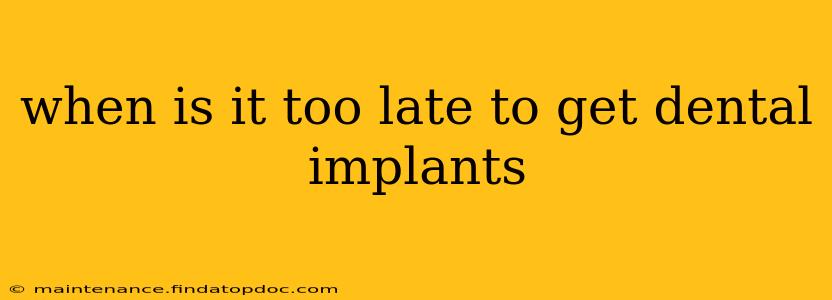The question of when it's too late for dental implants is a common one, and the answer isn't a simple yes or no. While age is a factor, it's not the sole determining element. A comprehensive assessment by a qualified periodontist or oral surgeon is crucial to determine candidacy. This article delves into the factors influencing eligibility for dental implants, dispelling common myths and providing a clearer picture of what constitutes a suitable candidate.
What Factors Determine Eligibility for Dental Implants?
Several crucial factors influence whether or not you're a suitable candidate for dental implants. These go beyond just chronological age:
-
Overall Health: Pre-existing conditions like uncontrolled diabetes, cardiovascular disease, or weakened immune systems can impact healing and increase the risk of complications. Good overall health is essential for successful implant integration.
-
Bone Density and Quality: Sufficient bone volume and density are vital for anchoring the implant. Bone loss due to age, periodontal disease, or previous tooth extractions can make implants challenging. Bone grafting procedures may be necessary in such cases to build up the necessary bone structure.
-
Oral Hygiene: Maintaining excellent oral hygiene is paramount for preventing infection and ensuring the long-term success of dental implants. Individuals with poor oral hygiene are at a higher risk of peri-implantitis, an infection around the implant that can lead to failure.
-
Smoking: Smoking significantly impairs healing and increases the risk of implant failure. Quitting smoking is highly recommended before and after the implant procedure.
-
Medications: Certain medications can affect healing or increase the risk of complications. It's crucial to inform your dentist about all medications you are currently taking.
Is Age a Barrier to Getting Dental Implants?
While there's no strict upper age limit, age can affect suitability. Older adults may experience decreased bone density, making implant placement more complex. However, many healthy older adults are still excellent candidates. The most important factor is the overall health of your gums, jawbone, and overall system. A thorough examination will determine your eligibility.
Can I Get Dental Implants If I Have Gum Disease?
Gum disease (periodontitis) can significantly compromise the success of dental implants. Untreated gum disease can lead to bone loss, making implant placement challenging or impossible. Aggressive treatment of gum disease may be necessary before implants can be considered. This might involve deep cleaning, periodontal surgery, or other restorative procedures.
What Are the Alternatives If I'm Not Suitable for Dental Implants?
If you're deemed unsuitable for dental implants, several alternative options are available, including:
-
Dentures: Removable dentures are a classic solution for missing teeth. Modern dentures are more comfortable and natural-looking than ever before.
-
Bridges: Fixed bridges use adjacent teeth to support a replacement tooth.
-
Partial Dentures: These are removable dentures that replace some, but not all, missing teeth.
How Can I Improve My Chances of Getting Dental Implants?
Maintaining optimal oral hygiene, managing any pre-existing medical conditions, and quitting smoking are vital steps to improving your candidacy for dental implants. Regular dental checkups allow for early detection and treatment of potential issues, maximizing your chances of a successful outcome.
Conclusion
Ultimately, the question of "when is it too late?" for dental implants is best answered by a qualified dental professional. A comprehensive evaluation will consider your specific health status, bone structure, and overall oral health. While age is a factor, it's not necessarily a disqualifier. Many older adults successfully receive and maintain dental implants for many years. Focus on proactive oral care and maintaining overall health to maximize your chances of achieving a beautiful and functional smile.
